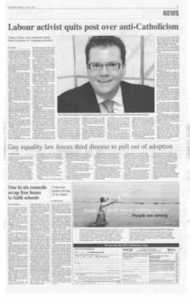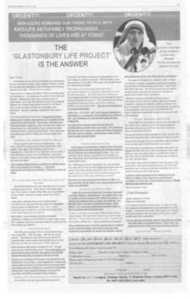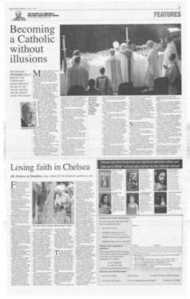Page 1, 30th May 2008
Page 1

Report an error
Noticed an error on this page?If you've noticed an error in this article please click here to report it.
Tags
Share
Related articles
Christians Forced Out Of Jerusalem
Worship Without Limits
The Vatican
Pope Paul Has Appealed To All Christians In All Parts
Relief As Nazareth Mosque Is Blocked
Don't let the Holy Land become a museum, cardinal urges Christians
BY ANABEL INGE
CHRISTIANS must remain in the Holy Land to stop the region's sacred shrines becoming mere "museums", the Vatican's most senior official for relations with Islam said this week.
In a wide-ranging interview with The Catholic Herald Cardinal Jean-Louis Tauran. president of the Pontifical Council for Interreligious Dialogue, said the Church has a duty to "save" the Christians of Israel and Palestine.
The French cardinal also disclosed that the Church is committed to helping to stem the radicalisation of a new generation of young Muslim men.
He said that his interreligious council has a responsibility towards this generation of alienated Muslim youth because "the mission of that office is to promote mutual understanding and respect between Catholics and the followers of other religions... and to promote the formation of persons dedicated to dialogue".
An important part of this effort is the introduction of dialogue to Catholic schools in the Gulf countries, he added, where Christians and Muslims mix freely in a "climate of brotherhood".
Cardinal Tauran said that Christians must maintain a presence in the Holy Land because their exodus is gradually stripping the holy sites of their living Christian tradition.
He said: "For us, a holy place like the Holy Sepulchre [in the Old City of Jerusalem] is not only the church, but the church plus the families who live around, the Christian families, their shops, their schools and their hospitals.
"This holy place is in the midst of a human community and we have to save this human community we are not interested in museums." He added: "We have to convince the Christians to remain, to be testimonies of their faith in this special part of the world where Our Lord lived, died and rose again."
Cardinal Tauran said that the Church must support Palestinian Christians by encouraging the building of housing and supplying struggling families with employment.
His comments follow those of Pope Benedict XVI, who earlier this month urged Israel to take active steps to preserve the Christian communities of the Holy Land.
Others have spoken of the "twilight of Christianity" in Israel and Palestine. Last month Fr Pierbattista Pizzaballa, the provincial of the Franciscan Friars Minor of the Middle East, the order which maintains most of the biblical sites in the region, said that the religion was in danger of disappearing from the Holy Land within two generations. Palestinian Christians, above all, are being driven out of their homeland by rising levels of poverty, the political crisis and their separation from Christians in Israel, he said.
Fr Pizzaballa added that in 1967 Christians made up 70 per cent of the population of Bethlehem, but now numbered just eight per cent of the city's residents.
Cardinal Tauran was speaking ahead of a historic November meeting with Muslim representatives in which the Pope will receive 24 scholars from each religion. The meeting will be the first of the Catholic-Muslim Forum, established in response to the open letter to Christian leaders signed by 138 Muslim scholars last year in an attempt to heal interfaith wounds since the Pontiff's controversial Regensburg lecture in 2006.
Cardinal Tauran expressed his hope that the talks, centred on the theme of "Love of God, love of neighbour", would usher in "the beginning of a deeper theological dialogue".
He said he was confident the dialogue would tackle the touchy subject of religious freedom despite the fact that the open letter neglected to address this point. He said: "The Church must have the schools, hospitals, massmedia, the possibility to express its points of view about questions of society, and so on."
But Cardinal Tauran dismissed any prospect of an immediate negotiation with Saudi Arabia, whose approximately one million Catholics mostly foreign workers are banned from worshipping publicly. He disclosed that the Vatican has received messages from the Kingdom addressing the issue but that talks are being delayed as officials await King Abdullah's response. Dialogue to build a church in Saudi Arabia will be "a gradual process", he said. "Hirst of all, we have to create an atmosphere of mutual confidence."
Saudi Arabia has previously responded by pointing out that the Vatican would not allow the construction of mosques in its own territory. The authorities, which advocate the conservative Wahhabi interpretation of Islam, cite a hadith (tradition) of the Prophet Mohammed that orders the expulsion of Christians and Jews from the Arabian Peninsula.
The Pontiff merged the interreligious council with the Pontifical Council for Culture in 2006, but his appointment of Cardinal Tauran in 2007 restored the profile of interfaith relations at the Vatican. The cardinal, who replaced the English Archbishop Michael Fitzgerald,. boasts a career in the Vatican's diplomatic service spanning nearly three decades and a reputation as an outspoken expert on international affairs.
He criticised the Israeli occupation of East Jerusalem in 1998, calling it illegal, and condemned the 2003 American-led invasion of Iraq as a "crime against peace". In 2004 Cardinal Tauran spoke out against what he regarded as the "second-class" treatment of Christians in many Muslim countries.
Editorial Comment: Page 11
blog comments powered by Disqus

















